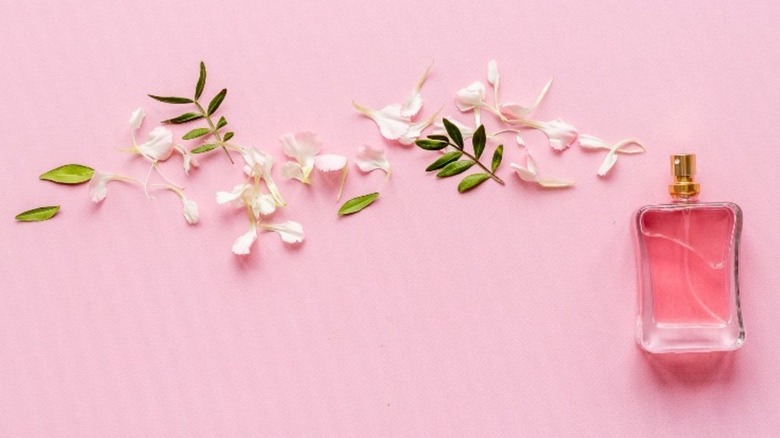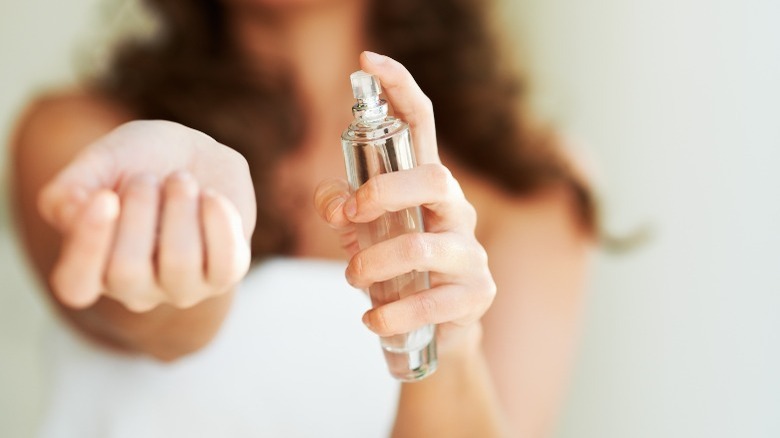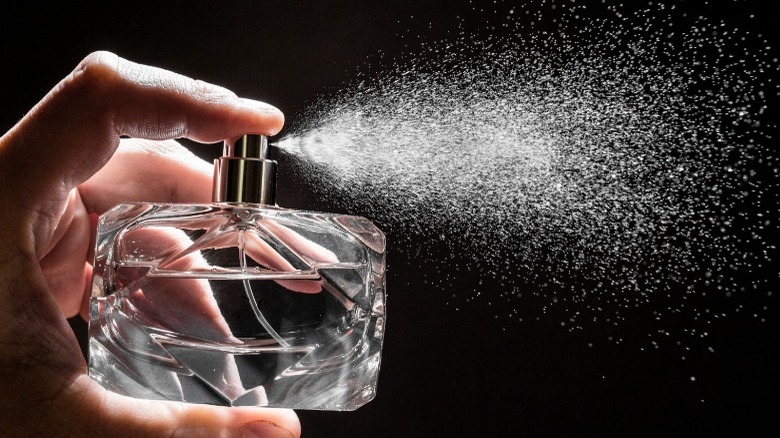How A Perfume Sillage Can Leave A Lasting Impression
Have you ever walked down a sidewalk when, all of the sudden, you encounter the smell of someone's beautiful perfume? You smell citrus and sandalwood. You must turn around to see who has walked past you — you expect someone well-dressed, confident, and happy — and of course, that is what you find. You wonder, how has their perfume lasted? How does it linger this way?
There is a word for this phenomenon: "sillage," pronounced "see-Yahj." The word comes to us from French and means "wake" in that language, and describes the trail of perfume scent left behind when someone walks by, per Elle.
You wonder next, how can I get my perfume to do that, too? How can I become the person whose scent turns heads on the street? Like the clothes we wear, it is no secret that the perfume we spritz ourselves with says a lot about us. Finding the right signature scent for you entails many factors, including its sillage. Your sillage can leave an intriguing impression on those around you, if it's done right. You might be giving others a headache if not, Sue Phillips, CEO of fragrance firm Scenterprises, told Byrdie. Here is how to achieve that balanced, lingering scent that will leave passersby entranced (and what to do if you've overdone it).
A perfume's diffusion
Knowing the varying potencies of different kinds of perfumes is the first step in achieving a beautiful sillage. On the spectrum of least to most potent, a eau de toilette will have the least amount of hold, while an extrait de parfum might have the strongest, per Byrdie. Other kinds of perfumes, for example, fragrance oils or parfums de peau are designed to remain on your skin, per Elle. But this is important: a lasting sillage is not defined by the strength of the perfume alone, but rather a combination of factors. The perfume should be strong enough to last, but diffuse enough to fall behind you as you move through space. Sophie Labbé, who has worked on scents for Bulgari, Estée Lauder, and more, told Elle that sillage is like "an aura."
The natural diffusive properties of the fragrances themselves influence a perfume's diffusion. For example, Sue Phillips told Byrdie, bright top notes such as citrus might not trail for as long as deeper, woodier notes, but both harmonize to create the perfume's sillage. While it can be difficult to test a perfume's sillage before purchase (as sillage tests require time and a scentless area), you can check the sillage of a perfume at home. Spray the perfume into a room, like a bathroom, close the door, and wait a few minutes. When you open the door again, the scent remaining might be similar to that of the perfume's sillage, per Scentbird.
The experience of a scent
Per Noteology, a perfume does not have to be deep and strong to have a complete sillage. Rather, sillage is about the experience of a scent over distance and time. To make your sillage last, you can also spray your clothes, like a scarf or sweater, that capture scent well, per Byrdie. Fragrances with less sillage can be described as more "introvert," per Scentbird, where the wearer is perhaps more concerned with pleasing themselves than others. A wearer who loves a long sillage then might be perceived as more outgoing and bold. Or, perhaps, they have simply put on too much perfume.
If you walk out of the door smelling like a thousand roses, just to realize that a thousand roses really is a lot of roses and now everybody on the subway is moving away from you, don't panic. Find a cotton ball, dampen it with rubbing alcohol, and dab where you sprayed the perfume, per Southern Living.


